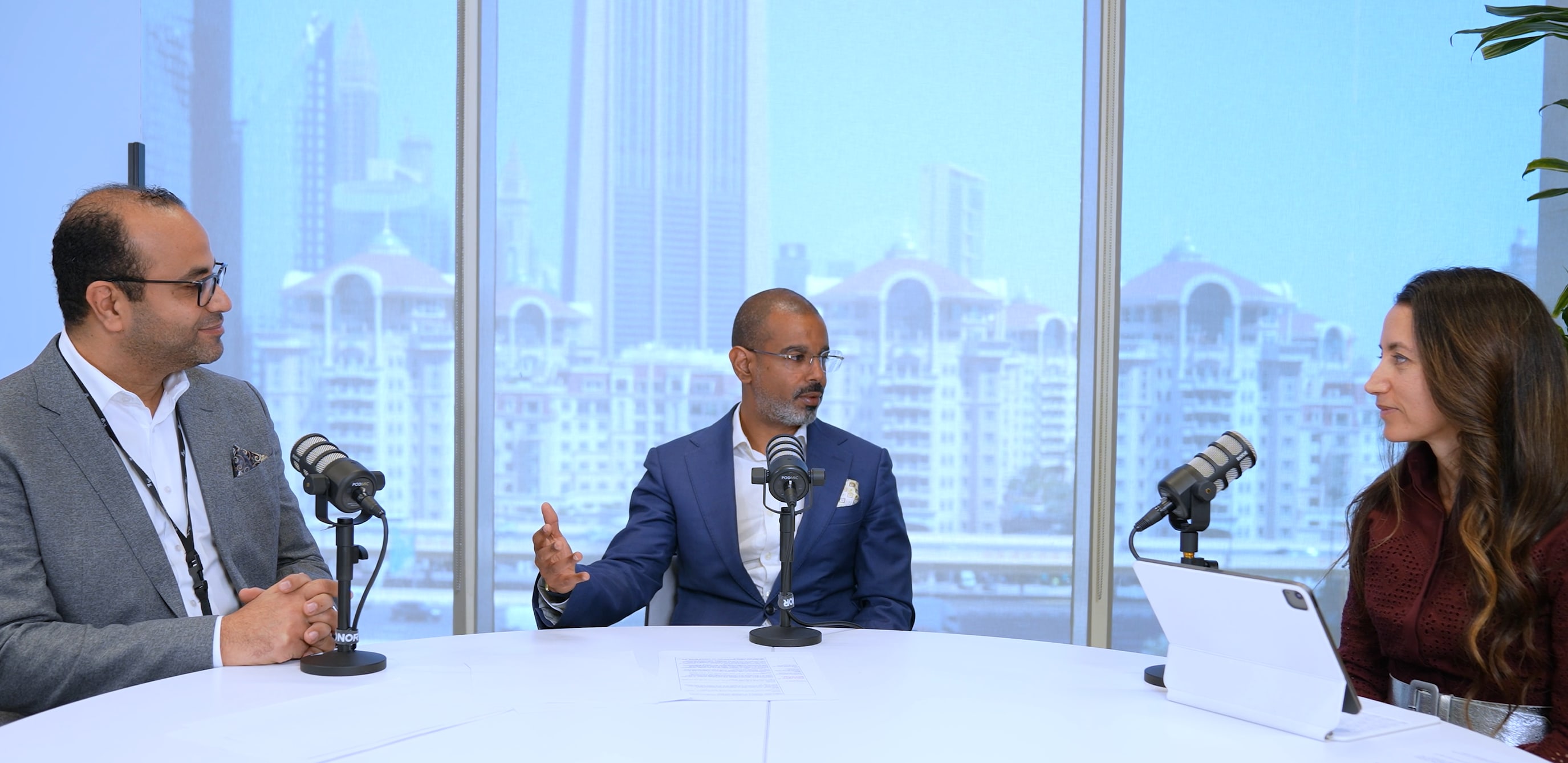Providing clarity on all things tax and legal
PwC partners and thought leaders provide valuable insights on tax reform, workforce considerations as well as regulatory and other tax and legal developments to help you prepare your business for the lasting impacts of events and the future. Our tax and legal podcasts provide you with the latest regulatory changes, technical updates, and commentary on hot topics to help you create your business strategy.


6-12% of GDP. That’s how much the Capital Projects & Construction sector contributes across the Middle East. AI adoption in the industry? Progress remains slow.
Despite its potential to cut delays, reduce costs, and improve efficiency, AI remains underutilised in construction. This episode explores the reasons behind slow adoption, the challenges unique to the sector and how Agentic AI can drive meaningful transformation.
Joining the discussion is Le Tilahun, PwC Partner in Capital Projects Services, who sheds light on the sector’s challenges and barriers to AI adoption and Ahmed Khafagy, PwC Director of Data & Analytics, explains how Agentic AI can bridge existing gaps and create new opportunities for businesses.
This conversation breaks down what’s holding AI back in construction, what’s changing, and how companies can integrate AI in a way that delivers real impact.
Patricia Keating: This is Reimagining Our Region, your go-to podcast for regional insights and trends. Each episode brings together expert discussions on the challenges and opportunities shaping The Middle East from economic shifts to emerging technologies. I'm Patricia Keating, Senior Manager at PwC Middle East.
Amal Larhlid: And I am Amal Larhlid, Partner at PwC. We will explore how businesses in The Middle East are adapting to remain competitive, focusing on business model reinvention, sustainable growth and the transformation needed to thrive in an evolving landscape.
Amal: The scale of urban and infrastructure development across The Middle East is unmatched. With projects this big, managing costs, ensuring sustainability and improving efficiency are top priorities. And, of course, we can't talk about efficiency without mentioning AI.
It's becoming a key tool in supporting these goals, but it's not a silver bullet. No technology can solve every challenge on its own. But when combined with industry expertise, collaboration and smart policies, it can drive progress in productivity and decision making. AI is transforming industries everywhere, but construction has been more complex to digitise. The industry has its own complexities, but the opportunities are just as big as the challenges.
A lot has been achieved, and even more is happening. What's the key to accelerating this transformation? Today, we will explore how AI and more specifically, agentic AI fits into this transformation. What's holding it back, and how can companies in the Middle East region make the most of this opportunity?
To get into it, I'm absolutely delighted to be joined by Le Tilahun, PwC Partner in Capital Project services, also leading our Construction Technology practice, and Ahmed Khafagy, Director of Data and Analytics in Capital Projects at PwC.
Welcome, gentlemen.
Le, if I may, I will start with you and just maybe look at the bigger picture when it comes to construction. We know that construction is one of the largest industries in the region, and it contributes up to 12% of GDP, right? The region has achieved a lot so far, in a very short period compared to the rest of the world.
But with demand still rising, there is a huge opportunity to build smarter, faster and more sustainable. From your perspective, where does the industry stand today and how can technology fit within this transformation?
Le Tilahun: Thank you, Amal, for the question. I think context is important, right? I think as you mentioned, building on your opening, construction is a huge part of the economy. On average globally, it's about 10% and employs about 10% of the workforce.
In the region, it's particularly important and in The Kingdom even more because it's a key enabler for the economic diversification as part of the 2030 vision. It's hugely important, and the value at stake is massive. At the same time, within that, the backdrop we're looking at within the industry is that historically, has always underperformed.
A lot of major projects are delivered late, over budget. Half, if not more than half of the projects do not deliver on the benefits that they were expected to deliver. If you look at the productivity lag, it's one of the least productive industries in terms of the productivity improvements, again, is at the bottom of the list. Add to that the digital adoption and level of innovation, although it's improving, is nowhere near where it should be.
And if you take some metrics around 25% drop in productivity, cuts the company's margins at about 1%, and a lot of the supply chain in construction works at 5% margin or less.
Amal: Very thin margin already.
Le: Already. You can see the issue that the construction industry needs to address. Right? But as we look at what is causing these issues on projects under performances, we've kind of cut them to about 10 key reasons. By our assessment in PwC, about 70% of those can be addressed to some extent meaningfully through digital and technology.
Amal: Oh, that's significant. 70%.
Le: 70%. That is anywhere from early stage portfolio optimisation, looking at where should they deploy their money and all the analytics, the insights that are needed to make investment decisions, all the way through looking at how do you do design efficiently, how do you procure and manage contracts effectively, and also how do you drive productivity during execution.
The whole value chain, there's a huge part that is digital. The opportunity is there. The value of stake is big, and the barrier is no longer the tech, but more around the industry's ability to maximise on technology.
Amal: Do you do you think that this this lag is due to the cost of AI adoption and technology, or is it more a mindset challenge?
Le: Yeah. It's a great question. Back in the day, the cost of technology was big. Technology was expensive, data was expensive, storage was expensive; the skill sets, acquiring them was expensive.
I think most of those are now easily available. Data has never been cheaper, technology has never been more available, and AI is democratising and lowering the barrier even more. The cost of not doing it now far outweighs the cost of doing it. But the business case for digital and technology (we do a lot of this work with our clients) is becoming much more straightforward.
Why is it not happening at the pace? Your question. I think what we need to understand is most of the time, projects are seen as short term. There's a start, a middle and an end. They're not a core business that happens, you know, annuity basis, if you will.
That means, one - people don't plan and invest over the long term, two - is very much built on expertise and biases. There's a heavy reliance on that, and there's a heavy reliance on leveraging labour. When you're looking at this part of the world where labour is relatively cheap, there's a tendency to throw more people at the problem as opposed to looking at a different way to address it.
The reality is skill shortage is a big thing. Globally, I did a study in The Middle East in 2018. I did a study in Australia in 2021, and we've also been looking at sort of the skills market in recent times, and it's not getting any better.
I was just talking to an ex-colleague of mine in the UK, and one of the biggest issues that they have with the infrastructure spend that's coming up, defence, etcetera, is skill shortage.
One of the biggest opportunities AI brings in digital brings is automation and allowing you to do more with less.
Amal: As you mentioned, Lee, the cost of no action outweighs the cost of action. It's no longer a luxury; people have to take action at this stage.
Maybe, just to come to you, Ahmed. Let's compare a little bit the construction sector with other industries. For example, we know that the adoption rate in other industries like finance and logistics is far higher. How is construction catching up?
Ahmed Khafagy: I think one of the key differences that I witnessed between construction sector and other industries is the accountability of the AI agenda. We've seen other industries appointing Chief AI Officers owning the AI agenda and ensuring that it's progressing year after year for the last ten years. I think this is not really happening, no one is really owning the AI agenda, and I think some of the development companies are doing very well on the innovation side. The other dimension is about data readiness.
AI cannot work without data. Other industries have invested a lot in building the right foundation of data, building the right data governance practices, data management, building central data platforms and knowledge bases. I think there is little effort that have been done on that aspect in the construction sector so far.
Le: Yep. Just quickly building on that. Construction industry is one of the oldest industries in the world.
It's highly repetitive, very well standardised, data rich environment. The challenge has been it's just not being captured and organised through history. I think, and I agree with everything Ahmed said, there's a work that needs to be done in terms of how you actually capture and structure data in a way that enables AI.
Amal: Yeah, absolutely. Thank you both for that.
Let let's move to a slightly different area.
When we talk about the power of third parties and ethical considerations when it comes to agentic AI in the construction sector. I have an interesting example, which is actually phenomenal. You might know this example well. But, for our audience, a UK company that is specialising in Agentic AI, raised more than $11,000,000 to accelerate AI adoption in the construction sector.
The benefits are mind blowing. They managed to save over hundred and seventy five thousand hours and more than 3 and a half million dollars while also driving a six times increase in adoption rates. The one interesting feature of this platform is integrating an AI powered Co2 tracker. I'm al always interested in the sustainability impact. They helped reduce over 9,000 kilotons of carbon emissions across more than 700 projects.
That really brings to life the power of AI. But it also raises an important question around developers, contractors, and all the stakeholders within that ecosystem.
Do you have any views around how important third parties actually are in that mix or in that ecosystem?
Le: No. Absolutely, 100%. If I take a step back, the construction industry has been innovating but in pockets. They're mostly what I would call point solutions.
But what they've not been looking at is technology at scale in an integrated way, which where AI would thrive the most. But to your question, for this to be successful and impactful, you have to mobilise the whole value chain.
The clients that we work with can digitise, but they can't really leverage or maximise the impact unless the supply chain that serves them and the third parties are linked into that. That can be that can go all the way down to material suppliers. Although the focus of this conversation is around AI, I mean, can look at material technologies and other things, construction technology is broader than that, I think we're focusing around the digital one.
For example, let's take the view of leveraging digital twins and AI layers. For that to happen, the designers need to be plugged into it, the contractors need to be plugged into it, the suppliers need to be plugged into it.
Ahmed: The whole ecosystem.
Le: Unless the whole ecosystem is plugged into it, you're not going to get the full benefit out of it, it's a journey. To your point, one of the biggest things that AI does is drive productivity. At least AI, Agentic AI will come to it. At least AI's initial benefit is productivity. Through productivity implicitly, you're reducing waste.
And by reducing waste, you grow sustainability.
Amal: Yeah. Well, thank you very much for that. This is a very nice segue to the next question around agentic AI.
Ahmad, what are your thoughts around how that is transforming the sector?
Ahmed: Sure. Let's look at what is Agentic AI; is basically the new evolution for generative AI. We've been witnessing a huge adoption worldwide on Gen AI applications in the past two, three years. But what Agentic AI is bringing right now is the capability to build AI systems that can work on behalf of human users, right, to achieve specific goals and using very advanced reasoning techniques, very advanced problem-solving techniques. This is what has been released by the major large language models and reasoning models in the past six months.
It's very new technology, I would say it’s considered the next generation for Gen AI. This is bringing a lot of opportunities and disruption in the in the construction sector because if you if think, for example, about the project manager right now in the construction sector, they might get for example a work order. Currently, they spend few days assessing the impact on the schedule, calculating the critical path, assessing the new scenarios, accepting or rejecting this work order.
With building those AI agents, they can fast track this by executing tasks on behalf of the project managers, doing the analysis on behalf of the project managers.
The technology right now is bringing capabilities not only on the content generation and content analysis side that traditional Gen AI applications used to do, but now we're bringing more execution and more leveraging on the wider IT capabilities with integration, integration with robotics, integration with line of business applications like ERP, CRM, project management tools, all the contech stack.
It's bringing a lot of opportunities in building those AI agents, serving the different roles within the industry in gaining more productive and definitely enhancing overall efficiency of the operations.
Le: Right. Just maybe to build on that as well. We're talking about skill shortage. Right? And one of the fears about AI is replacing jobs.
Amal: That was going to be my next question, actually.
Le: Go for it.
Amal: Talking about AI agents and the digital twins you mentioned earlier, there are a lot of discussions around how long are we going to be relevant for? Two years, five years? And then are we going to be completely replaced?
Yeah, any insights? I mean, this is relevant for construction, but also for wider industries.
Le: I mean, you know, Ahmed can talk more about that. I think just more of a light view from my side.
Around '20, I don't know, about 2016, 2017, around that time, there was a study done around different industries, how much of the activities done by those industries can be replaced by technology. This is before generative AI. At that time, around 47, 48% of the activities done in construction at that time could’ve been replaced by the technology that existed.
Fast forward to today, the number of activities, remember, I'm not saying jobs but activities done by individuals, I would say is significantly larger now, right, way more than half. What does that mean? At the moment, the pace at which capital is being spent, projects need to be cleared, and the skill shortage that exists is.. Let's say the clients only have 25 people, but they need a 100 people. What AI and Agentic AI allows you to do is not replace the 25 people, is help you deliver a 100 people's work with the 25 people that you have.
It takes away that constraint in the system, is not necessarily replacing jobs. Because one of the reans why it's going to be hard to replace jobs is a lot of the data because construction industry has a lot of inherent risks. The cost of failure of things is huge. From a cost angle, safety angle, you know, public liabilities, all that stuff.
At the end of the day, the human needs to be the control measure within the system and there needs to be a verification and validation of what the technology is doing.
Over time, that will become less and less, but my view is the role of the person will change and we would do less administrative stuff that can be automated, that means that we can focus on the things that add the most value and continue to drive productivity and improvements in the sector. It's an opportunity. At the moment, when we're having conversations with our clients on disruptive ways to do things, they're just too busy doing their day job. They haven't got the time to look up.
And the job that they're doing is not the most valuable, but it needs to be done. But this frees them as well. Right? If you automate a lot of this stuff, it helps prioritise their time and attention on things that actually have value.
For me, I'm excited about what this means for the industry.
Amal: Yeah. I will come to you, Ahmed, in a minute, but what we don't talk about enough is the new jobs that are created as part of the AI adoption as well. Because there are a lot of jobs that we didn't have before that are now being created. It is like a transformation of the workforce as for as well. Please, Ahmed.
Ahmed: This this was exactly my point that. There are fears of job replacement, but there are opportunities as well of creating new jobs.
I always say it's up to us how are we handling this reality. AI is becoming the new reality that everyone has to face. The more relevant we decide to be with coping with the technologies, we will definitely have a lot of opportunities. The fear is on people who do not really catch up with the advancements that are happening. This is the main risk.
I think having all these opportunities in the construction sector, executives need to look very carefully and plan ahead on all these opportunities in the coming few years. Because, again, the reports coming from Gartner, from all the analysts about the opportunity in Agentic AI specifically is huge. And I think, again, everyone needs to be part of this.
Le: Yeah. just quickly building on what Ahmed is saying. In the past, AI is not new. Right? I'm not a tech guy.
Ahmed: In the 50s.
Le: ...I look at technology more from the business angle, how do I how do I solve my clients' problems, but (AI) it's not new. People didn't know about it because it happened in the background. They knew of it probably, but they weren't interacting with it. What generative AI has done is actually brought it out of the backroom to the front where everyday people can now interact with AI, ChatGPT, generative design tools and stuff, just made it very easy and accessible.
What does that mean?
Now people are a lot more aware of the potential of technology than they were before. That's a good thing. Right? It's driving productivity. And in talking with Ahmed, one thing I've learned about what Agentic AI means is, you know, it's the essentially, you're moving from you doing the work and becoming more productive, to having somebody else doing it for you.
Essentially, Agentic AI is not a tool, it's an assistant. Somebody said that which I liked. Because that's what it is. It's not a tool that you use, it's an assistant that will do things for you.
Ahmed: Exactly.
Le: If we talk about a couple of use cases, let me kind of throw out, say procurement agent. Right? You could get to a point, we're probably almost there now, where you can have a procurement agent that would draft the initial RFP based on all the information and the requirements, then will send that RFP through for comments, distribute it to get the right feedbacks, incorporate the feedbacks, issue that to the market, receive the bids, evaluate them against the RFP, send it around for comments, put it through the approval workflows, all the way through to the award of the contract. Even beyond that on the commercial side, it can assess payments, submissions against the contract, it can assess claims against the contract in a very automated way with minimal interaction with humans, though humans being plugged in as part of the workflow to get approvals.
Amal: This is really interesting actually, Lee, and it brings the question around risks, and accountability that was mentioned earlier. For example, in this specific example, it's a beautiful example where AI can actually remove a lot of inefficiencies from the process, accelerate the whole process from end to end.
But what if something goes wrong in that process? Who is going to be held accountable for that? And I think, maybe either for you or for Ahmed, I think that question of accountability is really important.
Le: Maybe I'll start.
On the approval workflows, once the RFP is drafted, for example, it gets distributed. A lot of the time, it gets distributed to humans who have to review those documents, make comments on them, make sure they're comfortable with what's there, add to them, take things out, amend, send it back through the system. AI will then incorporate, collect all the feedback, update it, send it back for approvals, etcetera, etcetera, so those control points are there. Right?
If the bits come back and it's doing the evaluation, it does the evaluation assessments, it has to be sent through the approval workflows and human beings.
Human beings are then spending their time and energy in providing value add feedback, and a lot of the hard work has already been done for them, so their time and energy then spent on the things that matter, the things that can be improved are the key. It gives them time to think and improve things as opposed to just getting paperwork out of the way. Amal: Absolutely.
Ahmed: In technical terms, there are two key mechanisms: what we call human in the loop and human on the loop. These are design principles that need to be considered when designing and building those AI agents. Whenever the AI agent is analysing data, content, and trying to take some decisions, they can interact with their human users on that decision. Once they get more trained and more mature, then human on the loop comes in, they can land on a decision and just give it to a human user to approve it or not.
In principle, business professionals should always be accountable for any decisions autonomously taken by AI agents. This is in short terms.
Thank you very much both. This is fascinating, and I could go on but this is all we have time for today.
Amal: Thank you so much for these valuable insights.
We have covered a lot today, how AI is shaping construction, the bigger challenges the industry faces, and the role of collaboration in driving progress. One thing became very clear from the conversation. While AI is a powerful enabler, it's not the only piece of the puzzle. The future of construction will be built on a mix of innovation, strategic thinking, and the ability to adapt.
A huge thank you to my guests, Le and Ahmed, for sharing their insights. And of course, thank you everyone for tuning in. If you found this discussion valuable, don’t forget to share, subscribe and stay connected for more insights.
Hosts

Amal Larhild
Partner | Tax and Legal Services
EMEA Sustainability Leader for Governments, PwC Middle East
Guests

Le Tilahun,
Partner | Capital Projects, Technology, Innovation & Strategy

Ahmed Khafagy,
Director | Data & Analytics Capital Projects & Infrastructure



© 2017 - 2026 PwC. All rights reserved. PwC refers to the PwC network and/or one or more of its member firms, each of which is a separate legal entity. Please see www.pwc.com/structure for further details.




